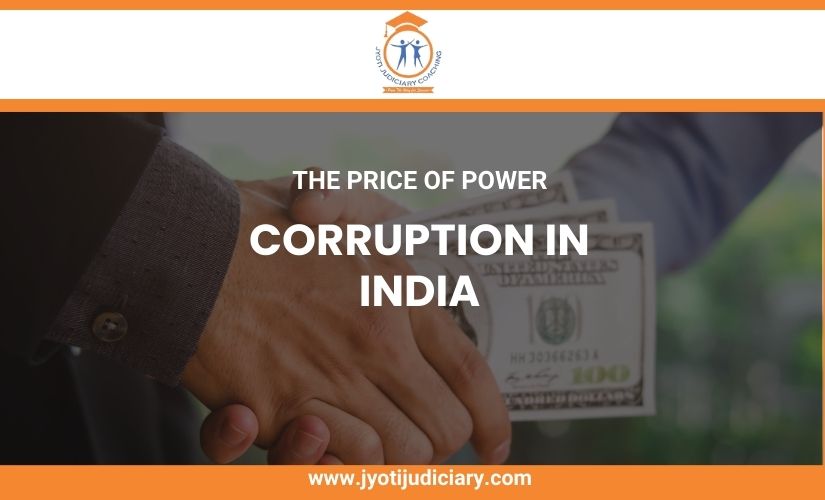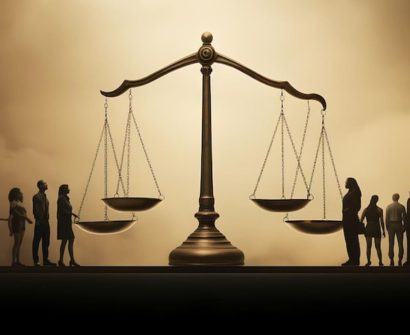
India is a country wherein corruption, an international evil that has plagued society everywhere, is particularly widespread. Its tentacles have grown far, undermining growth, undermining trust in institutions, and ultimately perpetuating inequality, from the highest echelons of power in politics to the lowest levels of bureaucracy. The pervasive existence of corruption poses an unexpected paradox in a country that draws pride in its rich heritage of culture and democratic ideals, hindering society’s progress and anticipating growth.
Corruption in India
- The definition of corruption is “destroying, ruining, or spoiling a nation or society.” Honesty, respect for the law, and a lack of fear are its defining characteristics.
- In essence, it is the abuse of authority for one’s own benefit. A wide range of actions fall under the category of corruption, including bribery, fraud, extortion, embezzlement, and the abuse of authority by elected officials, bureaucrats, and public servants.
- Today, eliminating corruption is one of the biggest problems facing Indian society.
- The Central Government has established commissions like the Central Vigilance Commission, often known as the CVC, the Central Bureau of Investigation (CBI), and the anti corruption bureau india (ACB) to efficiently implement anti-corruption laws in an effort to eradicate the evil of corruption.
Anti corruption act in india
An important piece of legislation passed by the Indian Parliament, the Prevention of Corruption Act of 1988, went into force on September 9, 1988, with the goals of promoting integrity in public administration and fighting for all india anti corruption.
Under the definition clause of Section 2 of the Act, it has expanded the definition’s application to include terms like “public duty” and “public servant.”
- As to the Code of Criminal Procedure of 1973, the onus of proof has been shifted from the prosecution to the accused individual.
- The provisions of the Act are extremely clear: the investigation must be carried out by an officer holding at least the rank of Deputy Superintendent of Police.
- The 1988 Act expanded the term “public servant” to encompass employees of the Central Government, union territories, nationalized banks, vice-chancellors, academics, and the University Grants Commission (UGC), among others.
- The Act makes corrupt behaviour illegal, including bribery, misappropriation, obtaining an unfair financial advantage, possessing assets that are out of proportion to one’s salary, and more.
Anti corruption agencies in india
- Central Vigilance Commission(CVC): It was established as the highest independent organization to combat corruption. Its job was to guarantee that the anti-corruption measures were followed by the central government departments by offering counsel and direction. It was given the authority to carry out impartial investigations and inquiries into complaints pertaining to any misbehaviour or abuse of authority by any administrative department, as well as accusations about corruption or other offenses covered under the Prevention of Corruption Act, 1988.
- Central Bureau of Investigation (CBI): Although the CBI is recognized as the principal anti-corruption investigative agency, it is not an independent organization and is either directly or indirectly supervised by the executive authority. The CBI is heavily impacted by politics, and its officials are interchangeable. Since the CBI is governed by the Central Government, the Prime Minister of India has some indirect authority over it.
- Comptroller and Auditor General (CAG): Every government department and institution is subject to statutory and internal audits by the CAG, which guarantees this transparency. The Comptroller and Auditor General’s main duty is to ensure that funds approved by the legislature are solely used for the intended purposes.
- Enforcement Directorate (ED): On June 1, 2000, the Central Government formed the Enforcement Directorate, whose main goal was to make sure that the Foreign Exchange Management Act of 1999 and the Prevention of Money Laundering Act of 2002 were both enforced.
The Role of anti corruption committee of india
Corrupt conduct is clearly defined under the National Anti-Corruption Commission as violations of public trust, abuse of official position, mishandling of information, dishonesty, and partiality. However, the extent of severe and systemic corruption and the realities of enforcing it are less obvious.
- In order to create an egalitarian society, the National Anti-Corruption Commission (NACC) is an independent, voluntary, non-governmental, non-discriminatory, and non-profit organization that works to defend, defend, and enforce the human rights of disadvantaged and alienated people in India and beyond.
- The National Anti-Corruption Commission (NACC) relentlessly promotes citizens’ “Human Rights” both domestically and internationally. The National
- Anti-Corruption Commission (NACC), which has its main office in New Delhi, collaborates with partners in numerous nations to promote human rights on a worldwide scale.
Corruption in India FAQs
1. Which state in India has highest corruption?
With 749 cases, Maharashtra was the Indian state with the largest number of corruption cases reported in 2022. Rajasthan came next, with 511 incidences of corruption reported.
2. Why corruption is increasing in India?
When taxes are high, it is less expensive to pay the corrupt official off than the tax. As per the survey, corruption is primarily caused by this in India and 150 other nations worldwide. The high capital gains tax in India promotes widespread corruption in the real estate sector.
3. How can we protect India from corruption?
- Regular enforcement of the laws designed to penalize corrupt behaviour is necessary.
- The media should publicize instances of corruption. This will help to reduce corruption to a minimum.
- The installation of cameras in the workplace has the potential to deter unethical behaviour.
- It is possible to stop people from becoming corrupt in the future by keeping an eye on everyone who has previously participated in corrupt activities.
- Because digital transactions make wrongdoing simpler to spot, digitalization could significantly reduce corruption.
4. How can we remove corruption?
- Elucidate the dangers and corrupt practices.
- Maintain accountability, transparency, and honesty in the public sector.
- Put an end to dishonest behaviour.
- Ensure that workers in the public sector behave in the public interest.
5. What causes corruption?
Greed for goods and money. Increased market and political monopoly levels. Low political openness, low civic engagement, and low democratic levels. increased bureaucracy and ineffective organizational frameworks.
6. Why is corruption bad?
The confidence we have in the public sector to act in our best interests is likewise undermined by corruption. Taxes and rates intended for significant community projects are wasted. This leads to subpar infrastructure or services, or initiatives that never get off the ground.
7. Why do people bribe?
In order to satisfy their financial demands and wants, professionals and opportunists may engage in bribery and corruption at work, or they may be given the chance to take advantage of the situation and benefit personally.
8. What is the concept of corruption?
Any dishonest or fraudulent activity that involves someone abusing their position of authority to further their own interests at the expense of others is considered corruption. The entity may be a person, business, or governmental body. This can manifest itself in a variety of ways, such as accepting or offering bribes, lying to investors, and deceiving them.
9. Is giving bribe a crime?
Anybody found guilty of bribery faces a maximum sentence of one year in prison, a fine, or both. However, bribery by treaty carries a fine that is the only penalty.
10. What is the IPC for corruption case?
The IPC’s Sections 161 through 165 address several forms of corruption, and this is the first line of defense against official corruption.
11. Is corruption a civil or criminal offence in India?
In the event that the prosecution is successful, the offending individual or business will face one or more criminal penalties from the court. Criminal penalties may consist of the detention of accountable people. penalties placed on accountable people and businesses.
With the goal of giving students the best coaching available for law entrance exams including the CLAT, AILET, and various other numerous state judiciary exams, Jyoti Judiciary Coaching, India’s Finest educational Platform, was established. Come enrol now with Jyoti Judiciary!
For any latest news, legal topics, judiciary exams notifications, patterns, etc watch Jyoti Judiciary’s YouTube channel for legal videos for any updates at https://youtube.com/@jyotijudiciarycoaching4852?si=2cwubh9d2A9urwJf










